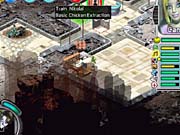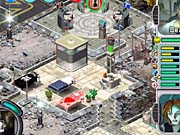FireFly Studios' Space Colony is a strategy game with two basic levels of management. On one level you have to manage a futuristic base, while on the other you have to manage the relationships between the crew members who inhabit the base. It clearly draws inspiration from Maxis' popular life-simulator The Sims (just take a look at the box cover), as well as from management games like RollerCoaster Tycoon, SimGolf, and FireFly's own Stronghold series. Though it has no multiplayer, the game does offer a great deal of content in the form of a comprehensive single-player campaign, a series of skirmish missions, and an open-ended sandbox mode. Plus, there's a map editor you can use to create your own levels. While Space Colony offers a great deal of breadth, and a surprising amount of depth, it never really capitalizes on either of these strengths to become an incredibly compelling or incredibly enjoyable game.

Space Colony's premise involves a ragtag band of misfits in the employ of a futuristic corporation intent on squeezing profits out of interplanetary operations like mining, farming, and even tourism. As such, in the single-player and skirmish maps, you're given a series of goals (like acquiring a certain amount of money, harvesting a certain number of space chickens, building a certain number of fixtures or structures, and so on) that you must complete to finish your current mission and move on to the next one. To do this, you have to build appropriate structures, such as a mining apparatus to scrounge silicon or iron from deposits on the planet's surface. You must then assign different crew members to operate these structures, assuming they're properly trained. Your crew members all have a finite measure of contentedness that, like in The Sims, depends on various personal needs. These needs include food, personal hygiene, entertainment, and social interaction. Also like in The Sims, some characters get along well, while others have such different personalities that they become enemies.
Accomplishing your goals in Space Colony is generally pretty straightforward. If you need to collect a certain type of resource, you build an extractor. You then assign a properly trained colonist to operate it and sit back and watch the work get done. If your colonists aren't properly trained, you can build a library or virtual training center to train them. Then you can sit back and watch them receive their training. If your colonists are unhappy because they're hungry, injured, or bored, you simply assign them to a corresponding structure in your base that fulfills that particular need. For instance, you can send them to a restaurant, a medical center, and a disco dance floor to cure the above-mentioned "ills." Then you can sit back and watch them refill their depleted needs. If your base is attacked by hostile aliens, you build defensive structures, like force field generators and laser towers, then you can sit back and watch your defenses zap the aliens until you're no longer under attack. The pacing for most of Space Colony's actions is pretty similar. You assign everyone to do what they're supposed to do, correct any problems that arise, and then sit back and watch the credits or resources roll in until another problem arises.
This is perhaps why Space Colony is an interesting game but not a truly compelling one. Though you have lots of different objectives to accomplish--from maintaining the power and oxygen levels in your base, to harvesting resources, to buying and selling resources in the marketplace, to defending your base from alien attacks--you can usually complete them all in the same methodical fashion. Once you do complete your objectives, you move on to the next mission--which is usually solved in a similar, straightforward manner. The game offers three difficulty settings, so it can sometimes be challenging. This is especially true of the game's later missions and on "hard" planets in galaxy mode, where you play individual missions with a specific group of colonists and goals. The interface, which is adorned with large, brightly colored buttons, lets you access various building and maintenance options quickly and easily. Your colonists often give you clear verbal cues to help you diagnose any problems, and they also let you know whether or not the problems they discover pertain to your base and/or your staff.
However, unlike the games that inspired it, Space Colony doesn't have outrageous and completely unexpected character interactions. Your colonists either like each other or they don't; and if they don't like each other, you must either have them talk their differences out, or they'll eventually fight. If they're not interacting with one another, they're usually doing only one of two other things: fulfilling a depleted need of some kind or working away. Unlike the games that inspired it, Space Colony doesn't have a constant stream of new, varied rewards and options that you unlock as you play. Instead, you have a certain number of structures and colonists available to you in each mission and a certain goal that must be accomplished by using them. After accomplishing your goal, the cycle repeats with your next mission.

At least Space Colony looks and sounds decent, though its production values probably could've been higher. For instance, your base is locked into a single, isometric view: Unlike most modern management games, Space Colony doesn't let you zoom or rotate what you're looking at, so you may sometimes have trouble seeing specific characters if they're obscured behind an object. The game does use colorful 2D graphics for its bases, aliens, and colonists (along with rendered animations for some of its cutscenes), though they're not especially detailed, nor are your colonists very well animated. You might hope that a game that uses somewhat-dated graphics would attempt to "go long" on personality. Space Colony tries to do this, but it doesn't really succeed. The game's voice acting is decent, and its many different characters are all over-the-top (but largely inoffensive) stereotypes. They include a dumb country hick, a spaced-out hippie, and a brainless blonde. However, while most of the characters are goofy and have some dialogue that's intended to be funny, none of them have quite enough voice samples, so they tend to become repetitive over time. At least the game has an appropriate techno soundtrack that fits well with the theme.
Between its campaign, single-mission galaxy mode, sandbox mode, and map editor, Space Colony offers enough single-player content to keep anybody busy. And it offers colorful 2D graphics and lots of different characters with completely different voice samples, though these characters don't have much in the way of detailed touches, distinctive animations, or memorable things to say. Space Colony does attempt to introduce innovation to management games with a personal relationship system, similar to the one found in The Sims, but it's not as complex or engaging. Despite all its content, Space Colony doesn't seem to offer enough interesting and/or satisfying options to keep you playing and enjoying the game for long.